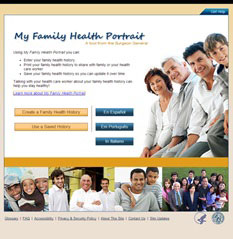 Ed. note: This blog is cross-posted from the U.S. Department of Health and Human Services news page. The original postdate was November 20, 2013.
Ed. note: This blog is cross-posted from the U.S. Department of Health and Human Services news page. The original postdate was November 20, 2013.
As we celebrate the Nation's 10th annual Family Health History Day this Thanksgiving, I encourage everyone to spend time talking with their family members about their health. National Family Health History Day is a great opportunity to draw attention to the importance of sharing family health history.
Both rare diseases and common ones, like heart disease, cancer, and diabetes, can run in families. Understanding your family health history can help you and your health care provider predict your risk for health problems and keep you and your family healthy.
As a physician, I know that a patient's family health history is an easy, quick and inexpensive way to get a rough estimate of how strongly a particular disease runs in a family. Knowing your family health history can help your clinician identify screening and treatment options that are personalized for you. For example, heart disease, which is the number one cause of death in women, can run in families. If someone in your immediate family — mother, father, sister or brother — has heart disease, you have twice the risk of developing heart disease as someone without that family history. Thanks to the Affordable Care Act, many preventive screenings are now covered under health insurance with no cost share for Americans.
While you can't change your family health history, you can act to reduce your disease risk and keep yourself and your family healthy. Making healthy choices is important for everyone, but it's especially important for those at higher risk because of a family history of disease. If you or others in your family have a history of heart disease or stroke, you can take steps to reduce risk by discussing with your physician the "ABCS" of the Million Heart Campaign: Aspirin for people at risk, Blood pressure control, Cholesterol management and Smoking cessation. These are all steps that can help prevent heart attacks and strokes.
The Surgeon General's My Family Health Portrait tool provides consumers with a free and easy way to record their family health information. Consumers are able to organize their family history information and share it with their family and health care professionals.
During this Thanksgiving holiday, I hope you and your family will take a few minutes to create a family health portrait. Learning your family's health history is a great way to invest in the future of your health and your family's health.

